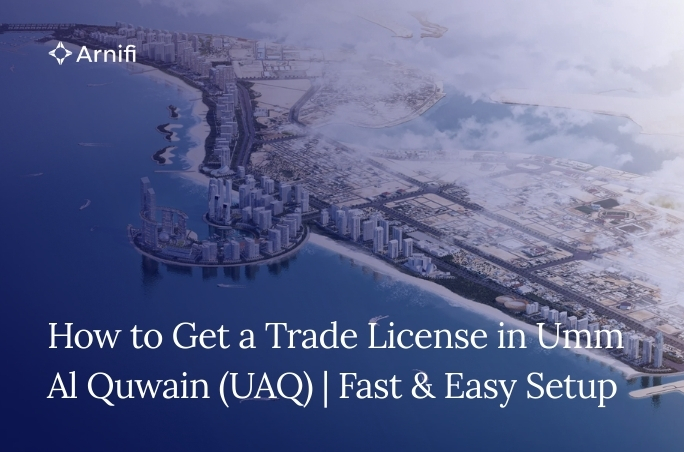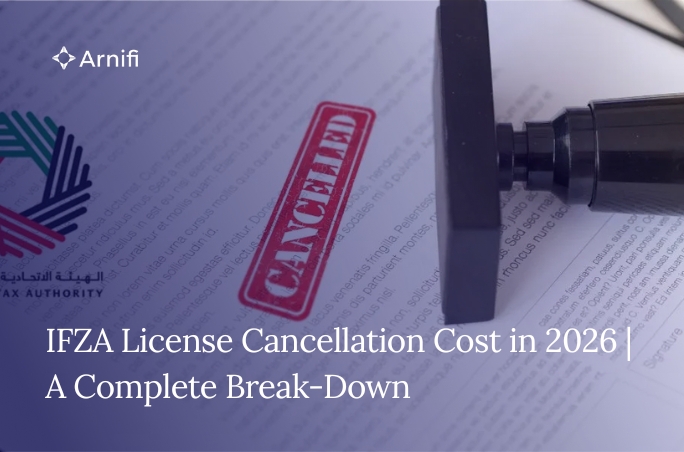How to Get a Trade License in Dubai, UAE in 2025?
by Shethana May 27, 2025  8 MIN READ
8 MIN READ

Dubai’s prosperity as a global business hub can be attributed to a cluster of entrepreneurial incentives such as world-class infrastructure, tax-friendly policies, and a strategic position linking East with West.
Table of contents
- What is a Trade License in Dubai?
- Types of Trade Licenses in Dubai
- Mainland vs. Free Zone vs. Offshore Licenses
- Step by Step to Get a Trade License in Dubai
- Documents Required for Trading Licence
- Costs Involved in Getting a Trade License
- Common Mistakes to Avoid
- Renewal and Compliance Requirements
- Benefits of Having a Trade License in Dubai
- Conclusion
How do you get your trade license to carry forward your tech startup, consultancy, or export business?
How to get a trade license in Dubai? The things to understand before getting one include the types of licenses available, the right authorities that issue them, and the background guiding all the paperwork.
This guide will loosely walk you through the process so you can make a good decision and confidently start your entrepreneurial journey.
We will discuss what a trade license is, the various types, distinctions between mainland, free zone, and offshore licenses, and how to apply for a license step by step.
What is a Trade License in Dubai?
This is an official document that legally authorizes to carry out business in Dubai. Meaning it’s the permission granted to your company to do business.
In simpler terms, it is a mandatory document & no matter of how big or small the business enterprise.
Trade licensing is issued by the Department of Economic Development (DED) or relevant free zone authority to state your approved business activity, name of the company, and legal structure. Without a trade license, you cannot open a bank account, sign office leases, or apply for visas.
According to UAE law, every business in an industry needs to be licensed under particular regulations. These applied for slight differences depending on whether.
Types of Trade Licenses in Dubai
Choosing the right type of trade license is crucial. It defines what your company can legally do and affects everything from visa eligibility to your ability to bid for government contracts.
Commercial License
This is for businesses involved in buying or selling goods. Like the Import/export businesses, retail shops, and general trading businesses.
Professional License
If you’re providing services—like consulting, design, or education—you’ll need a professional license. This type typically allows for 100% foreign ownership, especially under new UAE laws.
Industrial License
For businesses engaged in manufacturing or other industrial activities. You’ll need approvals from external authorities such as the Environment Department or Civil Defence, depending on what you produce.
Tourism License
Not mandatory for all businesses, but essential for travel agencies, tour operators, and hotels. This license is issued by the Dubai Department of Tourism and Commerce Marketing.
When figuring out how to get a trade license in Dubai, always match your business model with the right license type. A mismatch can lead to compliance issues or even legal penalties down the road.
Mainland vs. Free Zone vs. Offshore Licenses
Your location choice affects the licensing process and your business operations.
| License Type | Ownership | Market Access | Regulating Authority |
| Mainland | Up to 100% (in most cases) | Full UAE access | Department of Economic Development (DED) |
| Free Zone | 100% Foreign Ownership | Limited direct UAE access | Specific Free Zone Authority |
| Offshore | 100% Foreign Ownership | No UAE market access | Offshore Registrar (e.g., JAFZA Offshore) |
- Mainland licenses allow you to work with local clients and bid for government projects. You can open offices anywhere in Dubai and hire more staff depending on your office space size.
- Free Zones offer full ownership and are cost-effective for startups. However, you can’t trade directly with the local market unless you partner with a local distributor.
- Offshore companies are useful for international business, asset protection, or holding intellectual property. They can’t operate inside the UAE or rent office space.
When evaluating how to get a trade license in Dubai, consider your target market, ownership preferences, and whether you need a physical office.
Step by Step to Get a Trade License in Dubai
Here’s how you can move from idea to legal business status:
a. Choose Your Business Activity
Dubai recognizes over 2,000 business activities, from consulting and food trading to manufacturing and marketing.
Your activity must align with the license type. For example, a consultancy business cannot use a commercial license. Select carefully, as this choice affects approvals, fees, and visa eligibility.
b. Decide the Legal Structure
Whether you’re a solo entrepreneur or starting with partners, you need a legal form, like an LLC, sole proprietorship, or corporation.
Each has implications for liability, taxation, and how much of the company you can own.
c. Reserve a Trade Name
Your company’s name must reflect your activity and adhere to UAE naming rules. Avoid names with religious references or government terms.
Once chosen, submit it to the DED or relevant authority and pay the reservation fee.
d. Apply for Initial Approval
This is the government’s go-ahead to start your business registration. It doesn’t give you the license yet, but it signals that your business plan is acceptable. It usually takes 2–3 days.
e. Choose Office Space or Business Address
For mainland businesses, you’ll need an Ejari-registered lease. Free zones offer flexi-desk options if you want a cheaper or remote-friendly setup. Your office size can also affect how many visas your company gets.
f. Prepare and Submit Documents
Typical documents include passport copies, application forms, your Memorandum of Association (MoA), and tenancy contract. Errors or missing documents can delay approval, so double-check everything or hire a consultant to help.
g. Receive Trade License
Once your paperwork is approved, you’ll receive your license. This can be delivered digitally or picked up in person. Processing usually takes 3–7 working days.
Documents Required for Trading Licence
Here’s what you’ll typically need:
- Passport copies of all shareholders
- Emirates ID (if applicable)
- No Objection Certificate (NOC) for residents
- MoA and Local Service Agent Agreement (if needed)
- Lease agreement (Ejari or free zone flexi-desk contract)
If you have foreign shareholders or complex ownership, you may also need notarized or attested documents from your home country.
Costs Involved in Getting a Trade License
The total cost can vary depending on your license type and location. Here’s a general breakdown:
- Trade name reservation: AED 620+
- Initial approval and registration: AED 1,000–3,000
- Office lease or flexi-desk: AED 10,000–50,000 annually
- License issuance fee: AED 5,000–15,000
- Optional: PRO services, visas, local sponsor fees
Annual renewal fees also apply, usually similar to your first-year cost.
Common Mistakes to Avoid
- Choosing the wrong license type for your activity
- Submitting incomplete or incorrect paperwork
- Forgetting about visa quotas or residence requirements
- Missing your license renewal deadline (incurs penalties)
Double-check everything or get professional advice—mistakes can be expensive.
Renewal and Compliance Requirements
Most trade licenses in Dubai are valid for one year. You’ll need to renew on time by submitting:
- Updated lease or Ejari
- Trade license renewal form
- Copy of your existing license
Late renewals incur daily fines. Also, make sure to update your license if you change your business activity or company structure.
Benefits of Having a Trade License in Dubai
Getting a trade license gives you:
- Legal status and credibility
- Access to UAE and global markets
- Ability to sponsor visas for staff and family
- Eligibility for a corporate bank account
- Opportunities to bid for local contracts and government work
Also Read:
- How to Check Trade License Online in Dubai in 2025?
- How to Renew Trade License in Dubai | Step-by-Step Renewal Guide
- How to Get a Forex Trading License in Dubai | Step-by-Step Guide 2025
- How to Obtain a General Trading License in Dubai: A Step-by-Step Guide 2025
- How Much is the Cost of a General Trading License in Dubai?
- How to Verify a Trade License in Dubai?
- How to Download Trade License in Dubai, UAE?
Conclusion
Getting to grips with how to get a trade license in Dubai is not about crossing every single box on the list for the sake of it. It is about making the right decisions that lay the foundation for a successful enterprise. Every step matters, from rightfully selecting the license to ensuring proper paperwork. If you have doubts, never try it on your own. Seek the assistance of a consultant who knows the nitty-gritty of the process. With competent guidance, a great idea we will set up in no time with fewer headaches. Start smart, set yourself out well, and let Dubai bear your fortune.
Top UAE Packages

Related Articles
Top UAE Packages



